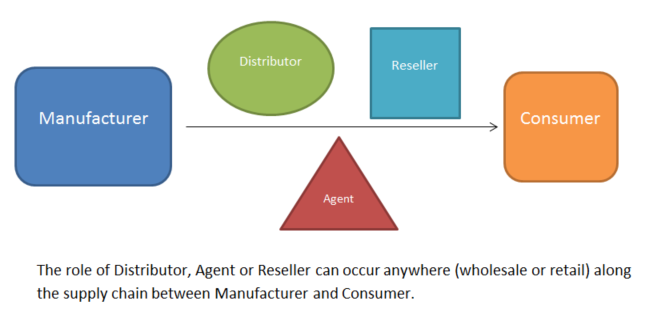The manufacturer who needs to get their goods to an end user will consider the possible partners for their supply chain. These partners can be Distributors, Agents or Resellers. We look at each role in the supply chain.

Each of these roles have a different purpose and responsibilities, and can occur at any point in the supply chain. Let’s look at each of them one by one.
The role of a distributor generally involves the storage and purchasing of product from the manufacturer or supplier. Product is then on-sold to other wholesalers or resellers. Usually, the distributor’s scope is narrower than that of a reseller, as they will specialise in a particular industry or market.
Sometimes described as a wholesaler, a distributor is similar to that of an agent who creates a relationship between the manufacturer and resellers (sometimes known as a retailer) in the distribution channel.
The relationship between the manufacturer and the distributor is often one of exclusivity, meaning no other organisation is authorised to market or sell the product within a certain territory or industry. Consequently retailers and or resellers can only source the product from the distributor.
Unlike resellers, Distributors will often need to reach and maintain certain sales or order targets in order to retain their distributor status.
Distributors can also provide additional after-sales services such as warranty servicing and repairs, as well as marketing or branding services.
Depending upon the arrangements the distributor has with its retail network it may or may not sell directly to the end user.
 Distributor Agreement Template
Distributor Agreement TemplateOur Distribution Agreement Template is used when a manufacturer or supplier of a product wishes to develop a distribution network. The Distribution agreement documents the agreement reached between the parties where the distribution rights granted are either non-exclusive or on an exclusive basis within a specific geographical area.
The agent is hired to find customers for, and sell the products or services of a ‘principal’ party. The Sales agent is appointed and empowered to facilitate or negotiate a transaction on behalf of the principal in return for a commission.
The agents role may be exclusive or non-exclusive and they may or may not have a specific geographical territory. Agents do not hold stock.
 Use our Sales Agency Agreement whenever you hire a ‘Sales agent’ to find customers for the products or services of a ‘principal’ party. The Sales agent is appointed to facilitate or negotiate a transaction on behalf of the principal in return for a commission.
Use our Sales Agency Agreement whenever you hire a ‘Sales agent’ to find customers for the products or services of a ‘principal’ party. The Sales agent is appointed to facilitate or negotiate a transaction on behalf of the principal in return for a commission.
This package includes an exclusive agency agreement and a non-exclusive agency agreement.
Similar to distributors, resellers may purchase from the manufacturer directly or through a distributor at ‘wholesale’ prices and on sell to the consumer at a higher ‘retail price’.
Resellers find buyers for your product, either at a wholesale level or to the end-user or consumer. Resellers create value by leveraging sales channels and effectively act as a ‘middle-man’, handling the sales, marketing and supporting the product in the marketplace.
The term reseller is quite broad and is sometimes used to mean someone anywhere in the supply chain either at a wholesale or retail level.
 Our Reseller Agreement is used when a product supplier is looking to develop a retail network. The reseller may be a wholesaler, or a retailer who ultimately sells the product to the end user.
Our Reseller Agreement is used when a product supplier is looking to develop a retail network. The reseller may be a wholesaler, or a retailer who ultimately sells the product to the end user.
Under the terms set out in the agreement the Reseller accepts the appointment as a non-exclusive reseller, to market and promote the sale of the Products it purchases from Supplier. Under no circumstances is the reseller to act or purport to be an agent of the supplier.
A solid Reseller agreement can protect your business by defining the relationship with your distribution network and shielding you from potential liability.